Free Forum Q&A : JANE McGONIGAL, REALITY IS BROKEN – How Gamers Can Change the World
Written on October 17th, 2014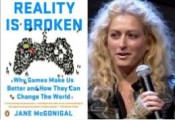 |
In her There are 183 million active video gamers in the US, and the average young person will spend 10,000 hours gaming by the age of 21. There are now more than five million “extreme” gamers” in the US who play an average of 45 hours a week.
According to game designer JANE McGONIGAL, this is because videogames are increasingly fulfilling genuine human needs. But she goes way beyond that, in her first book, REALITY IS BROKEN– just out in paperback – she suggests we can use the lessons of game design to fix what is wrong with the real world.
Drawing on positive psychology, cognitive science, and sociology, she shows how game designers have hit on core truths about what makes us happy so that videogames consistently provide the exhilarating rewards, stimulating challenges, and epic victories that are so often lacking in the real world.
I recommend REALITY IS BROKEN to people who have no interest in games. Separate from what it says about the current reality and possible future of games, the book is an excellent primer on what we have learned – and most people don’t know – about happiness, learning, productivity and growth.
Free Forum Q&A: RICK HANSON, author of Hardwiring Happiness
Written on December 31st, 2013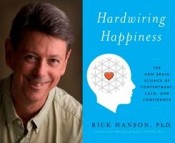 |
Aired: 12/29/13
My guest this week is RICK HANSON, neuropsychologist, and author of the best-seller BUDDHA’S BRAIN. We’re going to talk about his latest book, HARDWIRING HAPPINESS, where he brings together mindfulness and neuroscience and offers pro-active practices to actually shift the brain’s neural structure – the hardwiring – toward calm, contentment, and confidence.
This time of year can be challenging for people. Holidays bring us in contact with family, which for many carries a charge. We’re all asked to be more social than usual. We need a story to tell. And it feels natural to take stock and self assess at the end and beginning of a calendar year. We can be hard on ourselves.
Rick Hanson and I are going to talk about how you can use new lessons science is learning about the brain to overcome it’s — so far evolutionarily successful — negativity bias – the brain’s tendency to hardwire negative and threatening experiences more easily, more quickly than positive ones. It’s important that you avoid predators. And the ones who didn’t had fewer children.
Free Forum Q&A – SONJA LYUBOMIRSKY The Myths of Happiness: What Should Make You Happy, but Doesn’t, What Shouldn’t Make You Happy, but Does
Written on August 13th, 2013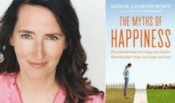 |
Aired: 08/11/13
This week we’re going to talk about happiness. So let’s start with a true-false test. I’ll tell you a supposed fact about happiness, and you decide whether you think it’s true or false.
1. Unexpected pleasures are the most rewarding. True or false?
2. Novelty in a relationship has similar effects on our brain as a high from drugs. True or false?
3. Daily hassles impact our well-being more than major life events. True or false?
4. When it comes to sex, women require more novelty than men. True or false?
5. The genes that underlie who gets divorced are passed down from parents to children. True or false?
6. A smoking habit is not a bigger risk factor for heart disease as a troubled marriage. True or false?
7. Renters are happier than homeowners. True or false?
Okay, let’s see how you did…It turns out, according to today’s guest, all seven statements are true. Yup, renters are happier and women want more novelty in sex than men. Where do I get off making those assertions? All based in science.
Today’s guest, SONJA LYUBOMIRSKY, Professor of Psychology at the University of California, Riverside, is one of the nation’s top students of happiness, and we’re going to talk today about the findings in her new book, THE MYTHS OF HAPPINESS: What Should Make You Happy, but Doesn’t; What Shouldn’t Make You Happy, but Does.
Originally from Russia, SONJA LYUBOMIRSKY received her A.B., summa cum laude, from Harvard University and her Ph.D. in Social/Personality Psychology from Stanford University. Not too shabby. Her research has been awarded a Templeton Positive Psychology Prize, a Science of Generosity grant, a John Templeton Foundation grant, and a million-dollar grant from the National Institute of Mental Health to conduct research on the possibility of permanently increasing happiness. She is author of The How of Happiness, translated and published in 19 countries, and her newest, THE MYTHS OF HAPPINESS.
Q&A: ROKO BELIC’S, documentary – HAPPY
Written on February 2nd, 2012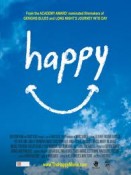 |
Aired 01/29/12
HAPPY. Are you happy? What makes you happy? Does money make you happy? Kids and family? Your work? Do you live in an environment that values and promotes happiness and well-being? Do you expect you’re going to get happier? How?
ROKO BELIC’S documentary HAPPY explores these sorts of questions. It weaves the latest scientific research from the field of “positive psychology” with stories from around the world of people whose lives illustrate what we’re learning.
The basic approach to the pursuit of happiness taken by many of us and by society in general isn’t delivering. We know more than we ever have about what science can tell us about happiness. And we have access to more diverse models and worldviews than ever before. This is a good time to ask some basic questions.
Q&A: JANE McGONIGAL, REALITY IS BROKEN – How Games Make Us Better and How They Can Change the World
Written on January 24th, 2012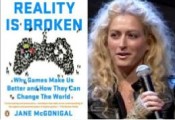 |
Aired 01/20/12
There are 183 million active video gamers in the US, and the average young person will spend 10,000 hours gaming by the age of 21. There are now more than five million “extreme” gamers” in the US who play an average of 45 hours a week.
According to game designer JANE McGONIGAL, this is because videogames are increasingly fulfilling genuine human needs. But she goes way beyond that, in her first book, REALITY IS BROKEN — just out in paperback – she suggests we can use the lessons of game design to fix what is wrong with the real world.
Drawing on positive psychology, cognitive science, and sociology, she shows how game designers have hit on core truths about what makes us happy so that videogames consistently provide the exhilarating rewards, stimulating challenges, and epic victories that are so often lacking in the real world.
I recommend Reality Is Broken to people who have no interest in games. Separate from what it says about the current reality and possible future of games, the book is an excellent primer on what we have learned – and most people don’t know – about happiness, learning, productivity and growth.
